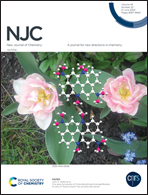Effect of the annealing temperature and of Bi substitution on the structural and magnetic behaviors of double-doping (Bi/La, Ca) (La0.8Ca0.2)1−xBixFeO3 compounds
Abstract
The perovskite (La0.8Ca0.2)1−xBixFeO3 (x = 0.00, 0.05, 0.10, 0.15 and 0.20) LCBFO compounds were synthesized by the sol–gel method using the citric acid route and sintered at 800 °C (LCBFO800) and 900 °C (LCBFO900). The structural properties studied by X-ray diffraction (XRD) revealed that all the compounds present the same crystallographic structure confirmed by the superposition of all the characteristic peaks. The slight deviation of the XRD peaks towards the weakest angles informed us that the volume of the elementary mesh increases as a function of the rate of substitution (bismuth). This observation, which is obviously valid for the two series, confirmed that the annealing temperature has no influence on the structure. Scanning electron microscopy (SEM) micrographs showed that the morphology of the samples is characterized by the presence of large agglomerates. Although, transmission electron microscopy (TEM) characterization confirmed the nano-sized grains. These two characterization techniques revealed that the LCBFO800 series presents the smallest grain size. The magnetic study exposed that all the samples (LCBFO800 and LCBFO900) show a weak ferromagnetic behavior (unsaturated hysteresis curves) and an increase in magnetization (M) with increasing Bi-content, with a higher M value for a lower annealing temperature. The Curie temperature is smaller in the case of LCBFO800 compounds and decreases with the insertion of Bi.



 Please wait while we load your content...
Please wait while we load your content...